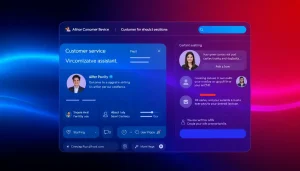Comprehensive Guide to Effective Call Center Services for Small Businesses
Understanding Call Center Services
In today’s business landscape, effective communication is crucial for success. For small businesses, implementing Call center services can significantly enhance customer interactions, streamline operations, and improve overall efficiency. This article delves into the nuances of call center services, their benefits, types, and how small businesses can effectively integrate these solutions into their operations.
What Are Call Center Services?
Call center services refer to outsourcing arrangements where third-party companies handle incoming and outgoing communications on behalf of a business. These services can range from customer support, sales, marketing calls, and appointment scheduling to technical assistance and complaint resolution.
The two primary categories of call center services are:
- Inbound Call Centers: These handle incoming calls from customers who seek assistance, inquiries, or support. Inbound services focus on customer service, technical support, and order processing.
- Outbound Call Centers: These are responsible for making calls to customers for marketing purposes, sales, surveys, or follow-up communications. Outbound calls aim to generate leads, conduct research, or increase customer engagement.
Key Benefits for Small Businesses
The advantages of adopting call center services for small businesses are numerous:
- Cost Efficiency: By outsourcing, small businesses can reduce labor costs associated with hiring, training, and maintaining an in-house team.
- Enhanced Customer Experience: With trained professionals handling customer queries, businesses can provide quicker, more efficient service, resulting in heightened customer satisfaction and loyalty.
- Scalability: Call center services can be scaled to meet seasonal demand or business growth, making them highly flexible and adaptable.
- 24/7 Availability: Many call center providers offer round-the-clock services, ensuring that customer queries are attended to at all times, significantly enhancing service accessibility.
- Focus on Core Business Activities: By outsourcing customer support, businesses can concentrate on their primary functions without diverting resources to manage service-related tasks.
Types of Call Center Services Available
Call center services can be divided into several categories based on their functionality:
- Customer Support Services: These are designed to assist customers with inquiries, troubleshoot issues, and provide necessary information regarding products or services.
- Sales Services: Outbound calls aimed at generating new leads, closing sales, and following up with customers after a purchase.
- Technical Support: Specialized assistance focusing on resolving technical issues that customers may encounter with a product or service.
- Telemarketing: A proactive outreach approach that involves promoting products or services through phone calls.
- Chat Services: Many call centers also provide support through live chat systems, allowing customers to communicate instantly via their preferred method.
Choosing the Right Call Center Services
Choosing the appropriate call center services involves a thoughtful assessment of business needs, cost considerations, and potential service providers. Here are essential steps to ensure the right choice.
Identifying Your Business Needs
Before selecting a call center service, it is imperative to assess your specific needs. Consider the following aspects:
- Volume of Calls: Estimate the projected call volume and peak periods to determine suitable service levels.
- Types of Services Required: Identify whether you need inbound, outbound, or a combination of services based on your business model.
- Customer Demographics: Understanding your customer base can help you choose a call center equipped to handle specific language or cultural needs.
Cost-Effective Approaches to Call Center Services
Achieving the best cost-effectiveness in call center services requires strategic planning:
- Evaluate Pricing Models: Different providers may offer various pricing structures, such as per-call fees, monthly retainers, or pay-per-minute. Select a model that aligns with your budget and call volume.
- Consider Hybrid Solutions: For some businesses, combining in-house and outsourced services can offer greater flexibility and control.
- Assess Value Beyond Cost: While staying within budget is important, consider the quality of service and potential return on investment when evaluating costs.
Evaluating Service Providers
Once you’ve established your business needs and budget, it’s time to evaluate potential call center service providers. Here’s how:
- Review Experience and Expertise: Look for providers with extensive experience in your industry or relevant expertise in handling your specific call types.
- Check Reviews and Testimonials: Seek feedback from current or past clients to gauge reliability and service quality.
- Assess Technology and Infrastructure: A reputable provider should utilize modern technology, including call tracking, customer relationship management (CRM) integration, and other tools that enhance service delivery.
Implementing Call Center Services
A successful implementation of call center services requires several strategic steps to ensure considerations are met effectively.
Steps to Integrate Call Center Services
Beginning with a new call center service involves specific integration steps:
- Outline Communication Protocols: Define how sevice representatives should address various customer interactions and ensure continuity in the customer experience.
- Set Clear Performance Metrics: Establish KPIs (Key Performance Indicators) that will measure success, such as call response times, resolution rates, and customer satisfaction scores.
- Collaborate with the Provider: Work closely with the chosen call center provider during the onboarding process to equip them with vital information about products, services, and customer expectations.
Training Staff for Successful Implementation
Training both your internal staff and the external call center team is essential:
- Conduct Joint Training Sessions: Involve both teams in training to ensure everyone is on the same page regarding processes and customer handling techniques.
- Utilize Role-Playing Scenarios: Practice real-life customer interactions to build confidence and skills among employees.
- Provide Ongoing Training: Continuous education and training sessions enhance skills and adapt to changing customer expectations.
Monitoring and Evaluating Performance
Continuous monitoring, evaluation, and strategic adjustments help ensure the success of call center services:
- Regular Performance Reviews: Schedule consistent evaluations to review performance against established KPIs.
- Gather Customer Feedback: Understanding the customer’s perspective is crucial in assessing the quality of service delivery.
- Adapt and Improve: Use insights gained from monitoring to make necessary adjustments and improvements.
Challenges in Call Center Services
Despite the numerous advantages, small businesses may encounter specific challenges when utilizing call center services, including managing customer expectations and overcoming negative experiences.
Common Issues Faced by Small Businesses
Several challenges often impede small businesses using call center services:
- Integration Difficulties: Merging external services with internal systems can occasionally lead to inefficiencies and miscommunication.
- Quality Control: Ensuring external agents maintain a level of service consistent with corporate branding can be challenging.
- Cost Management: Finding a balance between quality service and affordability remains a significant concern for many small businesses.
Addressing Customer Complaints Effectively
Customer complaints require immediate and effective response strategies:
- Empowered Agents: Equip your call center agents with the authority to resolve issues promptly, which can enhance customer satisfaction.
- Structured Complaint Procedures: Clearly defined processes for handling complaints ensure consistency and effectiveness in resolutions.
- Follow-Up Protocols: Following up with dissatisfied customers after issues are resolved can help regain trust and confidence.
Adapting to Changing Customer Needs
The business environment continually evolves, and call centers need to adapt accordingly:
- Continuously Analyze Trends: Regular assessments of customer interactions can reveal evolving needs and preferences.
- Solicit Feedback: Customers should always have a platform to express their thoughts about service changes, ensuring your approach aligns with expectations.
- Flexible Service Offerings: Adjusting service offerings based on customer feedback can enhance satisfaction and retention.
The Future of Call Center Services
The future of call center services is poised for significant transformation with technology playing an increasingly critical role. Understanding emerging trends can help businesses stay ahead of the curve.
Emerging Trends in Call Center Technology
The voice of the customer is becoming more varied, and adopting advanced technology is essential. Here are some trends that are shaping the future:
- Omni-channel Support: Integrating various communication channels—such as phone, email, chat, and social media—allows customers to choose their preferred method of interaction.
- Cloud-Based Solutions: Cloud technology provides flexibility and scalability for call centers, allowing for remote operations and reduced initial investments.
- Data Analytics: Advanced analytics tools provide insights into customer behavior and preferences, which can be used to enhance service delivery.
The Role of AI in Call Center Services
Artificial Intelligence (AI) is revolutionizing the call center industry:
- Chatbots: AI-powered chatbots can handle basic customer inquiries 24/7, enabling human agents to focus on more complex issues.
- Predictive Analytics: AI can analyze data to forecast customer needs, helping businesses proactively offer solutions.
- Natural Language Processing: AI systems using natural language processing can better understand customer queries, allowing for more accurate responses.
Preparing for Evolving Customer Expectations
Meeting changing customer expectations is vital for business success. Businesses must:
- Continuously Train Staff: Regular training enhances the capabilities of customer service representatives in adapting to new tools and methodologies.
- Foster Transparency: Customers appreciate when businesses are open about processes, saving time and building trust.
- Stay Agile: Flexibility in operations and service offerings enables businesses to adapt to customer needs as they evolve.














Post Comment